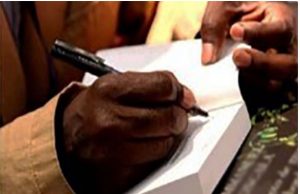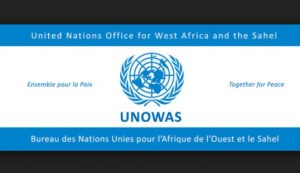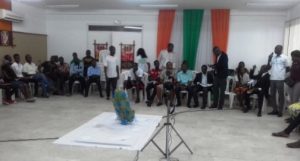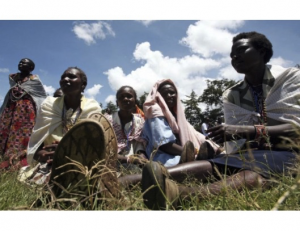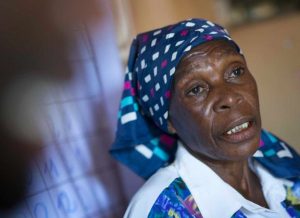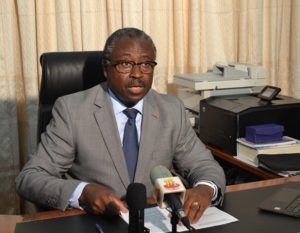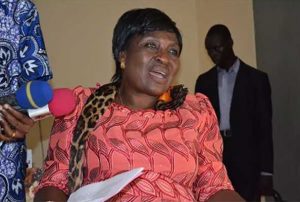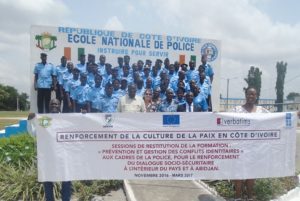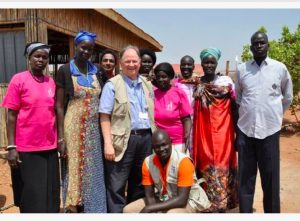, TOLERANCE & SOLIDARITY .
An article from Fasozine
On the eve of the opening of the international symposium on the dialogue of religions and cultures in Ouagadougou, Burkina Faso, the two main initiators of the meeting, Filippe Sawadogo* and Lazare Ki-Zerbo*, discuss in this interview the substance and the highlights of this important meeting on education for the culture of peace.
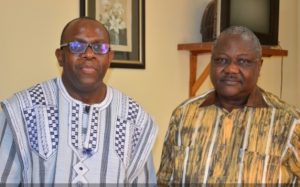
Lazare Ki-Zerbo* and Filippe Savadogo*
Fasozine.com: Ouagadougou is hosting an international symposium on the dialogue between religions and cultures from 3 to 7 March. Does this mean that the dialogue does not yet exist?
Lazare Ki-Zerbo: It is simply that the situation today invites us to remobilize the mechanisms of dialogue that exist and that have always existed. The Burkinabe people like to stand up to fight against injustices, andviolations. But there are times when we must also know how to fight for peace and for national cohesion. In the light of current events, you will agree that we must really mobilize to preserve and anticipate. We can not sit idly by while our neighboring countries deteriorate and disintegrate.
The initiative aims to strengthen the culture of peace in Burkina Faso and in Africa. What do you think are the ingredients of this culture of peace?
Filippe Savadogo: First of all, peaceful coexistence, which we express through living together. And this is reflected in several mechanisms and sources. By considering our traditional endogenous values, we observe, for example, that joking alliances – which we call “sinagouya” or “rakire” – have been able to temper many concerns during certain crises. Moreover, Africa has always been a continent where the culture of dialogue is a constant part of the education of young people from early childhood: respect for others, initiation to values, etc., and we must revisit all these questions in a world where challenges are only multiplying.
Finally, we also have external supports, such as democracy, good governance, human relations … which we can cultivate by adding new dimensions to build the African man of the new century, a century in which culture becomes engagement and contribution on several horizons towards a better future.
In the face of growing incivility, what place do you give to civic education in this process?
Lazare Ki-Zerbo: The growing incivility reflects the fact that there is a break in the intergenerational bond. In response, our initiative promotes education for peace, a process that should begin at school from a very young age. This is where the mechanisms of living together are learned. The roots of incivility, intolerance and violence must therefore be attacked by an intensive dissemination of the principles of peaceful cohabitation and acceptance of the other. These are the real mechanisms. The problem can not be solved by coercion and brutality.
How would you describe the level of coexistence among different religions in Burkina Faso at the present time?
Filippe Savadogo: In Burkina Faso, the recognition of religious pluralism is a reality. There are also consultations between religious leaders. A good example is the association “faitiere” which is presided by his majesty the Mogho Naaba and which initiates searches of endogenous solutions when there is crisis or misunderstanding.
However, we can also say that nothing should be taken for granted. We must therefore continue to cultivate respect and to understand that the acceptance of difference is an added value. Burkina Faso, a country in the heart of West Africa, has always been a crossroads for dialogue, peaceful cohesion, welcoming and learning about the positive values of other peoples.
Faced with the extremist and terrorist threats, what answers does the Ouagadougou symposium intend to bring?
Lazare Ki-Zerbo: Burkina Faso, is, in effect, at the head of the great old Sahel – the Niger loop, the great empires. To the south we are in relation with the coastal countries, to the west we have this long Border with the Mandingo world … I think that’s what makes us rich. A bit like Cameroon, Burkina is also an Africa in miniature and that is our strength. The fact that we have been at the center of all these great influences has allowed us to take advantage of their contributions and to become stronger.
The message of the symposium is thus: consolidate this capital, which is at the same time social, cultural, historical. A capital that is our wealth and can be a bulwark against the forces of division and separation.
(continued in right column)
(Click here for the original French version of this article)
Question related to this article:
How can different faiths work together for understanding and harmony?
(continued from left column)
Several well-known personalities take part in this meeting. What do you expect from their participation?
Filippe Savadogo: I believe that the presence of those who gained experience in the generation of independence, as well as scholars and scholars from several disciplines, reflects the fact that we want to put at the center of this symposium a framework of reflections that can lay the foundation for an action plan for the years to come. That is why we are thinking first of all of the major groups in our region, including personalities from ECOWAS countries (Sahelian countries) and the ECOWAS (Economic Community of West African States) West African Economic and Monetary Union. We will have many high-ranking personalities from these countries who will share their experiences.
The symposium welcomes, among others, a professor who comes from Central Africa, a country emerging from a crisis, which is now better, and who should share his experience with the participants. We can also mention the presence of the former President of the Transition in Burkina Faso, Michel Kafando, a great witness of his time, who will explain, from the first day of the symposium, the sources and resources that allowed the transition to overcome its obstacles.
Finally, the presence of the Secretary General of the International Organization of the Francophonie, Michaëlle Jean – who is staying in Burkina Faso as part of a visit – brings us the helpful dimension of the Fez process. Indeed, the question of interreligious and intercultural dialogue is a concern for all of the Francophonie. And at the last summit, heads of state and government still encouraged this kind of symposium …
So, are there bridges to be established between the “Libres ensemble” of La Francophonie and this symposium?
Absolutely! To the extent that everything leads to good governance, to democracy, but also to living together, which is a segment of being “free together” with the help of youth and women. Unesco also plays a significant role, since it has a tradition of researching the culture of peace. We also have Isesco with Dr. Cheikh Boubacar Doukouré, who has participated in the Baku process of the Alliance of Civilizations, as well as many others who will share their experiences with stakeholders from across our subregion. The press is also included because we have a large theme of “Media and Society”.
What do you think of the recent measure taken by the Beninese authorities to prohibit any religious grouping in public spaces? Is it, in your opinion, desirable? Exportable?
I think that a dialogue has been established on this issue with a pause for better reflection. But in another dimension, we can talk about the secularity of our states and the organization of all these issues. So we can find a solution in time, knowing that history is also a projection of the future.
Following the symposium of Cotonou, of which this is the continuation, how will you judge whether the symposium of Ouagadougou is successful or redundant?
Lazare Ki-Zerbo: We received a mandate from the Cotonou symposium to hold the national meeting in Burkina Faso because we know we have our own specificities. We will do it with local players, knowing that very often our human wealth is not sufficiently valued.
Thus, as an example, Cheikh Boubacar Doukouré, who is the president of Isesco’s executive committee (Unesco for the Muslim world), is also the president of the assembly of African ulemas, created recently in Morocco. He is a reference in this field, taking part in this symposium, which is also honored by the presence of Mr. Halidou Ouédraogo, President of the Human Rights Foundation. There is therefore considerable knowledge and know-how related to Burkina that will be highlighted in the symposium.
And all this will contribute to the drafting of the action plan …
Absolutely! The main thrusts of a plan for a peace education will emerge from the debates. We already have some ideas with the media and the researchers, so that we can arrive at an action plan. Its implementation will be supervised by a follow-up committee.
* Filippe Savadogo
Former Minister of Culture, Tourism and Communication, Filippe Savadogo, 63, is the coordinator of a French-speaking platform called Continental Horizon. He has served as the ambassador from Burkina Faso in France and then permanent representative of La Francophonie to the United Nations in New York. He was awarded the “Visionary Award” at the Pan-African Film Festival in 2013 in Los Angeles. The Burkina Faso diplomat is also the coordinator for Burkina Faso of the African Initiative for Education for Peace and Development through Inter-religious and Intercultural Dialogue.
* Lazare Ki-Zerbo
Author and actor in the Pan-African Movement and member of several civil society organizations – Manifesto for Freedom – Movement of Intellectuals, Joseph Ki-Zerbo International Committee for Africa and its Diaspora (Cijkad), Bandung Spirit Network – Lazare Ki -Zerbo was special advisor to the promoter of the African Initiative for Education for Peace and Development through Interreligious and Intercultural Dialogue led by Albert Tévoèdjrè. A graduate of the Institute of Federalism of Freiburg and the Austrian Center for Peace and Conflict Resolution of Burg Schlaining, he was also a program specialist at the Organization internationale de la francophonie from 2004 to 2014.
